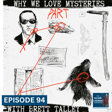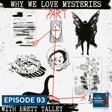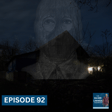
97. The Long Island Serial Killer and His Invisible Victims with Raul Montero, Part 1
The 2023 arrest of Rex Heuermann for the Long Island Serial Killer murders brought many answers. But would the murders have been solved faster if the victims were not marginalized? Raul Montero, a victims' advocate who has expanded his efforts beyond this case to attempt to help solve missing and unidentified persons cases across the United States, joins to discuss the case and marginalized victims.
Episode art by Hannah Hill., the talented artist who produces art for every episode of The Prosecutors podcast. To check out and support Hannah's art, check out her Instagram at @serious_moonlite or her website at https://linktr.ee/HannahHillArt.
Raul’s map of missing persons cases across the United States can be found here:
Raul’s collection of information on the LISK case can be found here:
Check out the Silver Linings Handbook website at:
https://silverliningshandbook.com/
Check out our Patreon to support the show at:
https://ww.patreon.com/thesilverliningshandbook
Join our Facebook Group at:
https://www.facebook.com/groups/1361159947820623
Visit the Silver Linings Handbook store to support the podcast at:
https://www.bonfire.com/store/the-silver-linings-handbook-podcast-store/



















